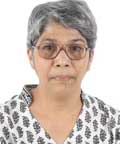HSO-152 Approaching Early Indian History Through Texts (Contact hours: 15) (One-Credit) Instructor of the Course: Prof. Kumkum Roy, D.D.Kosambi Visiting Research Professor.
-
GOA UNIVERSITY
Visiting Research Professorship Programme
D.D. Kosambi Research Chair in Interdisciplinary Studies
&
Dept of History, Goa University
Course on
HSO-152 Approaching Early Indian History Through Texts (Contact hours: 15) (One-Credit)
Instructor of the Course: Prof. Kumkum Roy, D.D.Kosambi Visiting Research Professor.
Course Coordinator- Prof. N S Bhat, Dean of Faculty of Social Sciences & Professor, Dept of History.
Participants: Students and Researchers of History and all those interested in History. Course is open and free for students & general public but registration is compulsory. Credit can be obtained by PG students of Goa University under CBCS.
Participation certificate will be issued to all those who maintain minimum75% attendance for the course.
Duration of the Course: From 04.01.2017 to 17.01.2017.
Venue- Seminar Hall, Social Science Faculty Block B, Goa University
Click here for ONLINE REGISTRATION
HSO-152 Approaching Early Indian History Through Texts (Contact hours: 15) (One-Credit)
Course contents, contact hours, teaching and evaluation:
The focus of the course will be to introduce learners to some significant textual traditions pertaining to early India, which continue to arouse widespread interest at present. Necessarily selective, the attempt will be to provide a sense of the diversity and richness of these traditions.
Questions that will run through the course will include those of the authorship and chronology of the texts, the intended audiences, the ways in which they were transmitted and preserved, the issues that were represented, strategies of representation and the social milieus in terms of which they may be contextualised.
Outline histories of early India may be used as background material for the course. The following two works are recommended as background reading:
Romila Thapar, Early India: From the Origins to AD 1300, London, Allen Lane, 2002.
Upinder Singh, A History of Ancient and Early Medieval India, New Delhi, Pearson, 2008.
SCHEDULE
The course will consist of seven interactive lectures of two hours each, and an open book assessment exercise of one hour.
Session – 1(04.01.2017 from 2.30p.m. to 4.30p.m.): : A broad overview of early Indian textual traditions – in Sanskrit, Prakrit, Pali and Tamil, with a discussion on the course structure.( Lecture for1hr.and15minutes + discussion for 45minutes = 2hrs.)
Session – 2(05.01.2017 from 2.30p.m. to 4.30p.m.) : Introducing and analysing the Manusmrti – based on Patrick Olivelle, Manu’s Code of Law: A Critical Edition and Translation of the Manava Dharmasastra, New Delhi, Oxford University Press, 2005. Additional Reading: Sharmila Rege, Against the Madness of Manu, New Delhi, Navayana, 2013.
Session– 3(06.01.2017 from 2.30p.m. to 4.30p.m.) : Alternative Perspectives on Caste – the Jatakas, a close study of the MatangaJataka – translation will be provided. Additional reading: UmaChakravarti, Everyday Lives, Everyday Histories, Beyond the Kings and Brahmanas of ‘Ancient’ India, New Delhi, Tulika, 2008.
Session – 4 (09.01.2017 from 2.30p.m. to 4.30p.m.): The Arthashastra and Strategies of Translation – A comparison of R.P. Kangle, The Kautiliya Arthasastra, Part II, Delhi, Motilal Banarsidass, 2010 and Patrick Olivelle, King, Governance and Law in Ancient India, Oxford, Oxford University Press, 2013.
Session – 5(11.01.2017 from 2.30p.m. to 4.30p.m.) : Alternative Perspectives on Kingship – revisiting the Jatakas with a focus on the Gandatindu Jataka – translation will be provided. Additional reading: Kumkum Roy, The Power of Gender and the Gender of Power, relevant articles, New Delhi, Oxford University Press 2010.
Session – 6 (13.01.2017 from 2.30p.m. to 4.30p.m.): The Courtesanal tradition – based on an excerpt from Wendy Doniger and Sudhir Kakar translated the Kamasutra, Oxford, Oxford University Press, 2002, and Sulasa / Sama Jatakas (translation will be provided).
Session – 7(16.01.2017 from 2.30p.m. to 4.30p.m.) : The limits of textualisation – a discussion on the Bharath of the Bhils, Mysore, Central Institute of Indian Languages, 2012.
Session – 8(17.01.2017 from 2.30p.m. to 3.30p.m.) : Assessment. This will be an open book exercise analysing a small section of a translation of one of the genres of texts discussed in class.
Biodata of Professor Kumkum Roy
Professor Kumkum Roy, Visiting Research Professor under DD Kosambi Chair in Interdisciplinary Studies, Goa University is a Professor at Centre for Historical Studies, School of Social Sciences, Jawaharlal Nehru University. Prior to that she taught at Gargi College, University of Delhi, and Satyawati Co-educational College, University of Delhi. Prof Roy is a PhD from the Centre for Historical Studies, Jawaharlal Nehru University, New Delhi. She was awarded the Commonwealth Academic Staff Fellowship for post-doctoral research tenable at the School of Oriental and African Studies, London, 1994-1995. She was also awarded fellowship tenable at the Institute of Advanced Study, Shimla, 1998, and is currently senior fellow at the Nehru Memorial Museum and Library, New Delhi.
Published Books
The Emergence of Monarchy in North India, 8th to 4th Centuries BC, As Reflected in the Brahmanical Tradition, New Delhi, Oxford University Press, 1994.
Women in Early Indian Societies (edited), New Delhi, Manohar, 1999.
A Historical Dictionary of Ancient India, Lanham, The Scarecrow Press, 2010
The Power of Gender and the Gender of Power: Explorations in Early Indian History, New Delhi, Oxford University Press, 2010
Insights and Interventions: Essays in Honour of Uma Chakravarti, (edited), Primus, New Delhi, 2011
Looking Within, Looking Without: Exploring Households in the Subcontinent through time, Essays in Honour of Nandita Prasad Sahai, (edited) New Delhi, Primus, 2014.
For details and course inquiry- [email protected]










